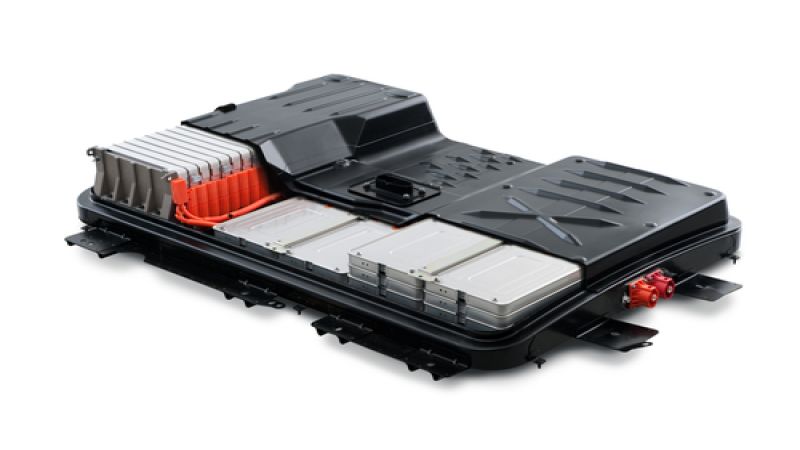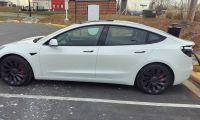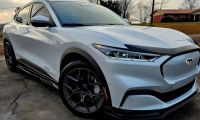Fast charging electric cars could become reality due to research at the Ulsan National Institute of Science and Technology (UNIST) in Korea. The scientists say their technology enables lithium-ion batteries to recharge at 30 to 120 times faster than current lithium-ion batteries. This would be a major breakthrough which would allow electric car drivers to recharge more-or-less as quickly as gasoline car drivers, if the technology works out, is safe, and if charging stations are built which support a matching charge rate.
The battery technology uses cathode material, standard lithium manganese oxide (LMO), soaked in a solution containing graphite. The carbonized the graphite-soaked LMO forms a network of conductive traces that run throughout the cathode which allow more of the battery to recharge at the same time. Put another way, all energy-holding particles in the battery start recharging simultaneously. In conventional lithium-ion batteries the recharge process starts at the surface of the cathode and works inward. This is what allows this battery technology to recharge more quickly.
To make a full battery, of course, the cathode is only part of the picture, and must be packaged with an anode and electrolyte.
One of the concerns about electric vehicles is the long recharge time required with current battery technology. “The development of such a battery could significantly raise the popularity of electric vehicles whose lithium-ion batteries currently take hours to recharge,” according to the Ministry of Education, Science and Technology.
If this technology works as expected, when fully implement it will require a charging system 30 to 120 times faster than current charging systems. The chargers in todays cars support either a 3.3 kilowatt or 6.6 kilowatt charge rate. Hence to get the full benefit of the new technology, charging rates would increase to the 198-792 kilowatt range.
The closest analogue in existing electric cars is Tesla's proprietary SuperCharger system which supports a 90 kilowatt charge rate, or less than half what would be best for batteries built with this new technology. That system is rated to provide 300 miles of range per hour of charging. At just the 198 kilowatt charging rate an electric car would gain well over 600 miles of range per hour of charging, and at the 792 kilowatt charging rate the car would gain 2100 miles of range per hour of charging. These numbers are approximate.
Figures like a 198-792 kilowatt charge rate seem nonsensical in todays electricity landscape. This level of electricity demand is more typical for an office building than a car. Obviously implementation of this fast of a charging rate would be best done along with a large grid energy storage system, so that the grid itself does not see the impact of the high charge rate.
This is early stage research and it is unclear when automotive quality batteries built with technology would exist.
Source: http://phys.org/news/2012-08-lithium-ion-battery-fast-charged-minutes.html
Lee, S., Cho, Y., Song, H.-K., Lee, K. T. and Cho, J. (2012), Carbon-Coated Single-Crystal LiMn2O4 Nanoparticle Clusters as Cathode Material for High-Energy and High-Power Lithium-Ion Batteries. Angew. Chem.. doi: 10.1002/ange.201203581











Comments
MIT several years ago
Permalink
MIT several years ago developed a fast charging battery, but after some use, the speed declined greatly - there was a buildup that prevented ion flow. The problem with batteries is that they are both slow to charge and exorbitantly expensive for applications such as cars (Tesla's battery pack reportedly costs over $40K). Nor will Tesla's Model S vehicle ever travel 300 miles on a single charge if the mileage is on an Interstate, any Interstate. Their own graphs show their Model S traveling but 240 miles even under the most ideal conditions at 70 mph (the most common Interstate speed, next to 75 mph Interstates). Turn on the A/C and the range drops to 217 miles. Add hilly terrain, cold temperatures and a car with more than two passengers (or rainy conditions) and the car won't come close to traveling 200 miles. And that is with a new battery. The mileage drops significantly after but a few years continues until the battery dies of old age. There is an enormous amount of ignorance out there about the characteristics of batteries. Buyer beware. Electric car makers will never mention
any of these battery negatives, especially the cost of a new battery pack.Batteries still remain the obstacle to a practical electric car.
Anonymous makes some good
Permalink
In reply to MIT several years ago by Anonymous (not verified)
Anonymous makes some good points, but I think she's too hard on LiIon. There is good evidence batteries in cars can last a long time.
There has been a 10+ year "experiment" of sorts happening with the original RAV4 EVs sold in California in late 2002, early 2003. Some 300 people bought these SUVs and continue driving them today. The range and reliability of the vehicles has been vastly superior to its internal combustion sibling.
The battery packs have shown remarkable longevity. However, they are NiMh, a robust chemistry for traction packs as it turns out. One RAV4 EV owner traveled over 150,000 miles before replacing his pack. He's well past 230,000 miles now. I sold my RAV after 8 years, 91,000 miles. It still, to this day, gets a full 100 miles per charge, and it's ten years old.
The great characteristics of driving EVs, the smoothness, predictability and reliability, are exactly the same as when the car was new. Now the body creaks some, and doors squeak a little, but the motor accelerates exactly the same, no change.
This is a very cool aspect of EVs that our drivers like. The car always works the same, all the time.
ALtairnano Technologies
Permalink
In reply to MIT several years ago by Anonymous (not verified)
ALtairnano Technologies developed such a battery years ago. The company was torn apart from the inside but has recently been acquired by the Chinese. Maybe it will get down to business now. The battery is used in a few EV's the Lightening out of the UK, Phoenix Motorcars,etc.
This type of battery has been
Permalink
This type of battery has been around for years. It's called the Nanosafe battery made by Altairnano Technologies a company which has been mismanaged or sabotaged into obscurity but now picked up by the Chinese. Charges in less than 10 minutes, tested to over 20,000 recharge cycles with no degradation, operates in extreme temperatures, can handle huge charges, no overheating issues, made with nano technology. It is placed within the Lightening EV cars from the UK, and the Phoenix Motorcars group, and is used by the Navy. Check it out. By the way David I tried to reply to your questions regarding my earlier comment but can not post a reply for some reason.
Why don't you check out the
Permalink
Why don't you check out the Altairnano Nanosafe battery. It has been around for years and already does all these things.